With a 47% potential improvement in customer satisfaction, hotels are turning to CRM systems to elevate guest experiences and operational efficiency. These systems are like personal assistants for hotels, collecting data, tailoring services to each guest’s needs, making operations run smoother, and helping hotels rake in more cash while ensuring guests have an awesome time.
Hotel CRM systems are like magic wands that transform the way hotels interact with their guests and run their operations. In this blog, we’ll unveil the top 10 best hotel CRM systems to know in 2024, exploring their key features and benefits.
Table of Contents
Why Your Hotel Needs a CRM System in 2024
In the hospitality industry, customer satisfaction and personalized service are paramount. A robust hotel customer relationship management (CRM) system empowers hotels to manage guest relationships effectively, ensuring a seamless and customized experience.
- Enhancing Guest Experience: An efficient hotel CRM system enables hotels to collect and analyze guest data, offering insights that elevate guest satisfaction through tailored services and targeted marketing campaigns.
- Boosting Revenue: By leveraging CRM data, hotels can augment direct bookings, implement dynamic pricing strategies, and upsell supplementary services, thereby maximizing revenue.
- Streamlining Operations: Integrating CRM with other hotel management systems optimizes operations, minimizing manual workload and enhancing overall efficiency.
How a CRM System Works
Customer Relationship Management (CRM) systems are essential tools that help businesses manage interactions with customers and analyze data throughout the customer lifecycle.
- Data Collection: CRM systems gather data from various touchpoints such as reservations, social media, and guest feedback forms. This comprehensive data collection allows businesses to build a rich profile of each customer, which is crucial for effective relationship management.
- Data Storage and Management: All collected data is stored in a centralized database, allowing easy access and management. By centralizing this information, businesses can ensure that all team members have access to up-to-date customer profiles.
- Data Analysis: Advanced analytics tools within the CRM system analyze the data to uncover patterns and insights about guest preferences and behaviors. These insights enable businesses to make informed decisions about marketing strategies and service improvements.
- Personalized Communication: Personalization is key to building strong relationships and increasing customer loyalty. Based on the insights gained, CRM systems facilitate personalized communication with guests through targeted emails, offers, and messages.
- Integration: Modern CRM systems integrate with PMS (Property Management Systems), booking engines, and other hospitality CRM software to provide a holistic view of guest interactions. This integration provides a holistic view of guest interactions, allowing businesses to optimize their strategies across various channels.
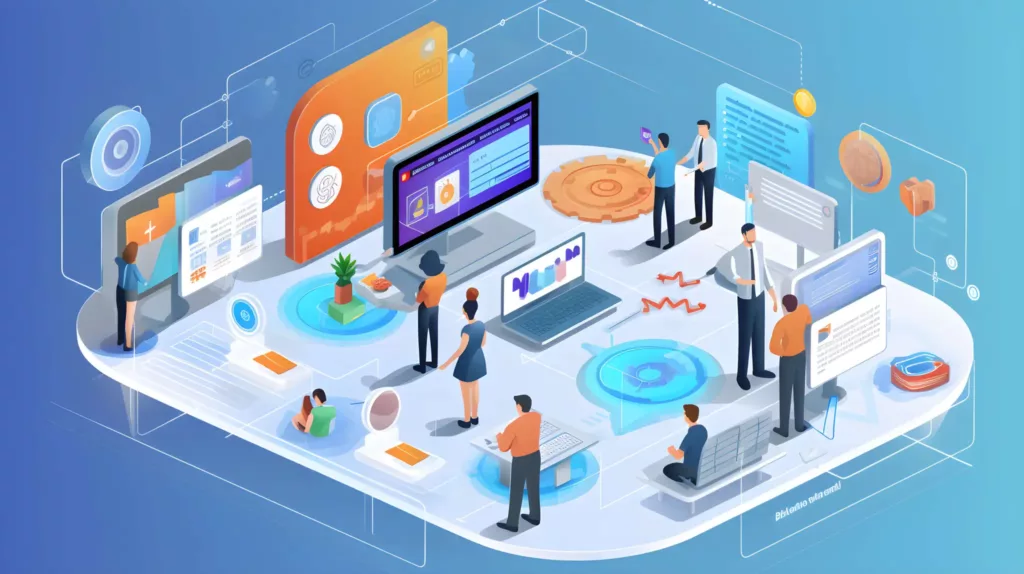
Key Features of Modern Hotel CRM Systems
Modern hotel CRM systems are designed to enhance guest experiences, streamline operations, and optimize revenue. Here are 9 key features that illustrate their effectiveness.
1. Guest Profiling: Hotels gather guest data from reservations, feedback, and preferences to create detailed profiles. This enables personalized service and targeted marketing. Pacifica Hotels used SHR’s technology to create detailed guest profiles for personalized service and marketing.
2. Personalization Engine: Personalization engines, like Experience Hotel, empower hotels to tailor communications and experiences based on guest preferences and behaviors, enhancing the overall experience.
3. Automated Marketing: Automated marketing tools help hotels create, schedule, and execute campaigns across channels like email, social media, and promotions based on guest actions or events, reducing manual effort and ensuring timely communication with guests.
4. Revenue Management: Dynamic pricing and revenue optimization tools empower hotel managers to maximize revenue by implementing strategies that respond to real-time market conditions. These tools enable hotels to adjust rates based on demand fluctuations, competitor pricing, and occupancy levels.
5. Booking Management: Integration with booking engines and Online Travel Agencies (OTAs) ensures seamless management of reservations. This feature allows hotel staff to view, modify, and manage bookings directly within the CRM system while synchronizing data across all platforms to eliminate discrepancies.
6. Loyalty Programs: CRM systems facilitate the management of loyalty and reward programs designed to retain guests. By tracking guest interactions and preferences, hotels can offer tailored rewards that encourage repeat visits and foster long-term loyalty.
7. Feedback Collection: Guest feedback tools are essential for hotels to enhance service quality. Cendyn’s CRM provides tools for collecting and analyzing feedback, enabling hotels to monitor satisfaction levels and make data-driven improvements.
8. Reporting and Analytics: Detailed reports and dashboards provide insights into key performance indicators (KPIs), such as occupancy rates, revenue per available room (RevPAR), and guest satisfaction scores.
9. Integration Capabilities: Modern hotel CRM systems seamlessly integrate with other hotel management systems, centralizing guest-related data and enhancing operational efficiency.
Tips for Successfully Implementing Hotel Customer Relationship Management
Implementing a hotel CRM system requires careful planning and execution. Here are tips to ensure a successful implementation of a guest management system for hotels, along with elaborations on each point:
1. Define Clear Objectives: Setting measurable Key Performance Indicators (KPIs) like customer satisfaction scores or repeat bookings will help track progress and evaluate the system’s success over time.
2. Choose the Right System: Your decision should be influenced by factors such as hotel size, guest types, and operational processes. A small hotel may prioritize personalization tools, while a larger chain might seek scalability and advanced reporting capabilities. Look for features such as guest profiling, automated marketing, and seamless integration with existing software.
3. Train Your Staff: To ensure efficient CRM utilization, design a comprehensive training program covering all system aspects, from data entry to report generation. Regular training sessions and refreshers keep staff updated on new features and best practices.
4. Integrate with Existing Systems: Seamless integration with existing systems such as Property Management Systems (PMS), booking engines, and Point of Sale (POS) systems is crucial for maximizing the CRM’s effectiveness. This integration allows for real-time data sharing, reducing manual entry errors and ensuring full access to up-to-date guest information.
5. Monitor and Adjust: Evaluate system performance by analyzing usage patterns, collecting staff feedback, reviewing KPIs, and adjusting the system as needed.
6. Encourage Staff Adoption: For the CRM system to succeed, staff must actively use and benefit from it. Encourage open communication about the system’s benefits, such as enhancing guest experiences and streamlining operations. By recognizing and rewarding employees who effectively utilize the system, you can motivate others to engage with it more.
7. Leverage Data Insights: From CRM data, you can analyze customer preferences, booking behaviors, and feedback to tailor services and marketing strategies accordingly. For example, if data shows that guests who book spa services tend to stay longer, hotels can create targeted packages that encourage this behavior.
Top Benefits of CRM for Hotel Chains and Corporations
Hotel customer relationship management (CRM) is a powerful tool that can help hotels of all sizes improve their operations. With a hotel CRM system, hotels can manage guest communication, automate tasks, and track guest preferences, and more benefits:
Enhanced Guest Loyalty: Personalized services, such as tailored recommendations and curated amenities, not only foster stronger guest relationships but also incentivize repeat bookings through loyalty programs. These programs encourage guests to choose your hotel over competitors, ensuring their continued patronage.
Improved Marketing Effectiveness: By leveraging data-driven insights, businesses can identify key customer segments and tailor their marketing messages accordingly. This targeted approach, based on guest preferences and behaviors, leads to higher engagement and conversion rates, ultimately resulting in more successful marketing campaigns.
Operational Efficiency: With a working hotel CRM system, manual work is reduced, operational efficiency is improved, and automated tasks free up staff to focus on delivering exceptional guest experiences. This is achieved by streamlining processes such as online booking and mobile check-in.
Better Decision Making: Data-driven insights provide valuable information for decision-making, such as optimal pricing strategies and resource allocation, enabling quick response to market trends and guest feedback through real-time analytics.
Increased Revenue: Direct bookings through the hotel’s website eliminate third-party fees, increasing revenue. Upselling opportunities, such as room upgrades and spa treatments, enhance the guest experience and generate additional revenue, further boosting the hotel’s profitability.
Customer Insights: Comprehensive data collection and analysis provide deep insights into guest preferences, behaviors, and demographics. This understanding enables the customization of services and amenities to meet the unique needs of each guest, resulting in enhanced satisfaction and loyalty.
Competitive Advantage: By implementing a guest management system for hotels, hotels can provide personalized guest experiences, differentiating themselves from competitors and creating a unique selling proposition. Additionally, it can enhance services through the guest management system, further boost brand reputation and attract new customers.
TOP 10 Best Hotel CRM Systems to Know in 2024
These systems represent the forefront of hotel CRM technology in 2024, each offering unique capabilities that cater to the diverse needs of the hospitality industry while enhancing guest satisfaction and operational efficiency.
1. Smart Host GmbH
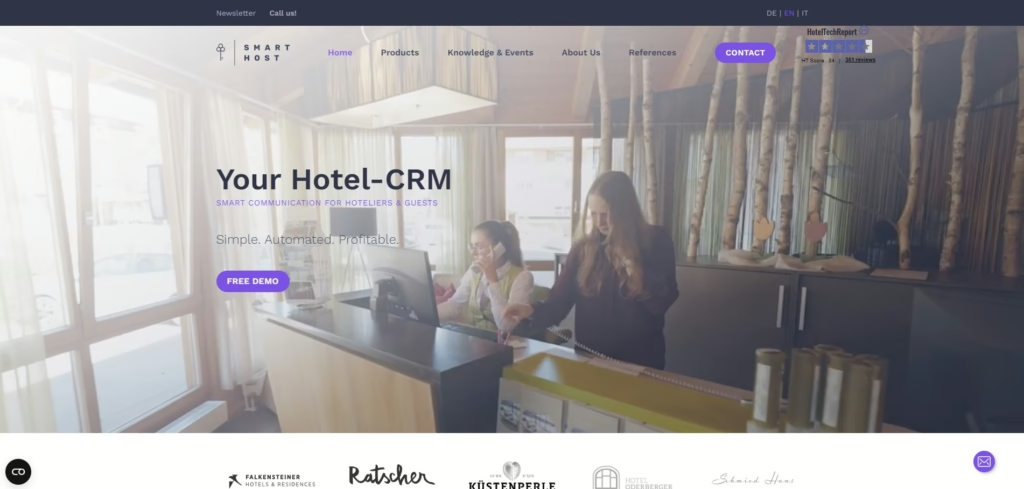
Smart Host GmbH specializes in automating guest communication, making it easier for hotels to engage with guests throughout their stay. The system is particularly popular with small to medium-sized hotels due to its streamlined messaging capabilities that enhance guest engagement. While praised for its ease of use, some users have suggested improvements to customization options for more tailored interactions.
Key Features:
- Automated Guest Communication: Streamlines messaging for pre-arrival, during-stay, and post-stay interactions.
- Multi-Channel Integration: Supports SMS and email communications to reach guests on their preferred platforms.
- Customizable Templates: Allows hotels to create tailored messages for different guest segments.
Pros:
- Streamlines communication processes.
- Enhances guest satisfaction through timely messages.
- Easy to implement and use.
Cons:
- Limited reporting features compared to larger systems.
- May require additional integrations for full functionality.
2. Maestro PMS
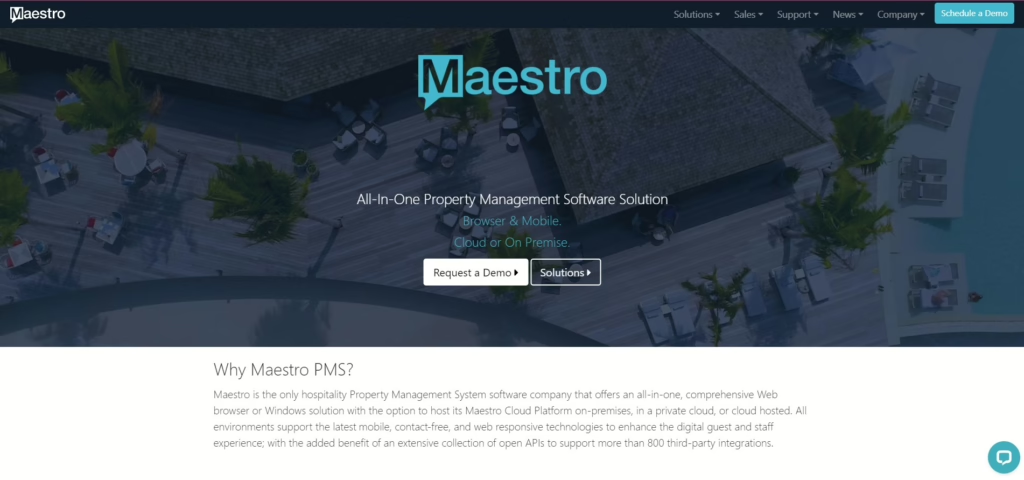
Overview: Maestro PMS is a multi-property management hospitality CRM software designed to streamline various hotel operations under one system. It offers comprehensive tools that cater to the unique needs of hotel chains and groups. Users appreciate its robust functionalities, but some find the interface complex initially. However, Maestro’s exceptional customer support ensures that users can quickly navigate the system and make the most of its features.
Key Features:
- Front Desk Management: Comprehensive tools for check-in, check-out, and guest services.
- Reservation Management: Handles online bookings and integrates with various distribution channels.
- Housekeeping Management: Tracks room status and assigns tasks to housekeeping staff.
- Revenue Management: Dynamic pricing tools to optimize revenue based on occupancy and demand.
- Analytics and Reporting: Generates detailed reports for performance tracking and decision-making.
- Multi-Property Management: Supports operations across multiple locations from a single platform.
Pros:
- Ideal for hotel chains or groups with multiple locations.
- Robust reporting capabilities.
- Strong customer support.
Cons:
- Can be complex to set up initially.
- Higher cost for smaller properties.
3. Amadeus Hospitality

Overview: Amadeus Hospitality excels in guest engagement automation, providing tools that enhance communication and marketing efforts. Its focus on advanced analytics and personalized communication sets it apart. Users appreciate the marketing features, which facilitate tailored interactions with guests. However, a potential area for improvement lies in the learning curve associated with the system. To fully harness its potential, time and training may be required.
Key Features:
- Guest Profile Management: Detailed profiles to enhance personalization.
- Automated Marketing Campaigns: Tools for targeted marketing efforts.
- Multi-Channel Communication: Engaging guests through various platforms.
- Analytics and Reporting Tools: Insights into guest behavior and campaign effectiveness.
Pros:
- Comprehensive suite of marketing tools.
- Strong analytics and reporting features.
- Proven track record with over 2,200 properties using the system.
Cons:
- Can be overwhelming due to the number of features.
- Higher learning curve for new users.
4. Cendyn
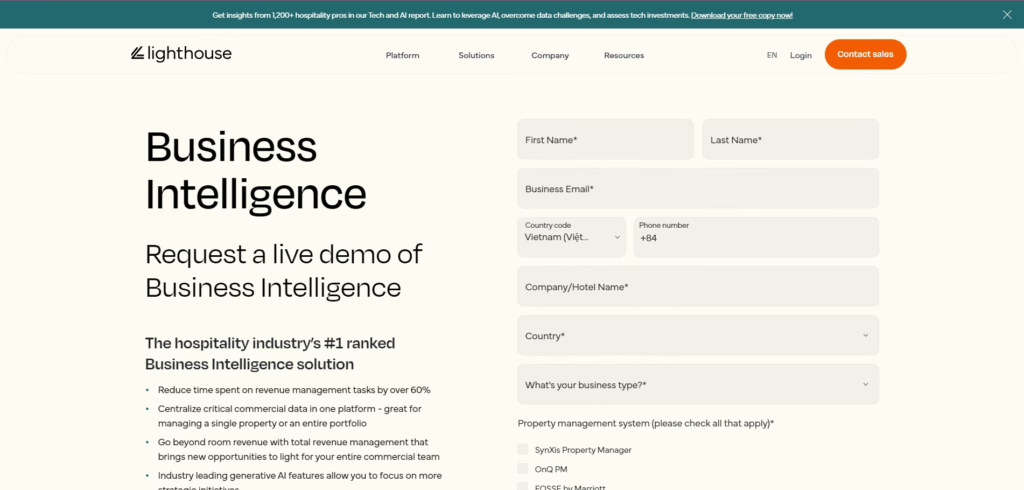
Cendyn, a leader in the field of guest relationship management, provides a CRM platform for the hotel industry that enables hotels to form and maintain long-lasting relationships with their guests. The platform stands apart due to its user-friendly interface and data-driven marketing solutions. Users highly value its email marketing features and loyalty program management tools. However, some users have reported longer response times from customer support, highlighting the need for enhanced service responsiveness.
Key Features:
- Email Marketing Solutions: Automated campaigns tailored to guest preferences.
- Loyalty Program Management: Tools to manage rewards and guest retention strategies.
- Data Analytics: Insights into customer behavior to inform marketing strategies.
Pros:
- Excellent user interface with intuitive design tools.
- Strong focus on data-driven marketing strategies.
- Continuous feature updates based on user feedback.
Cons:
- Higher price point compared to some competitors.
- Longer support turnaround times for large projects.
5. Profitroom
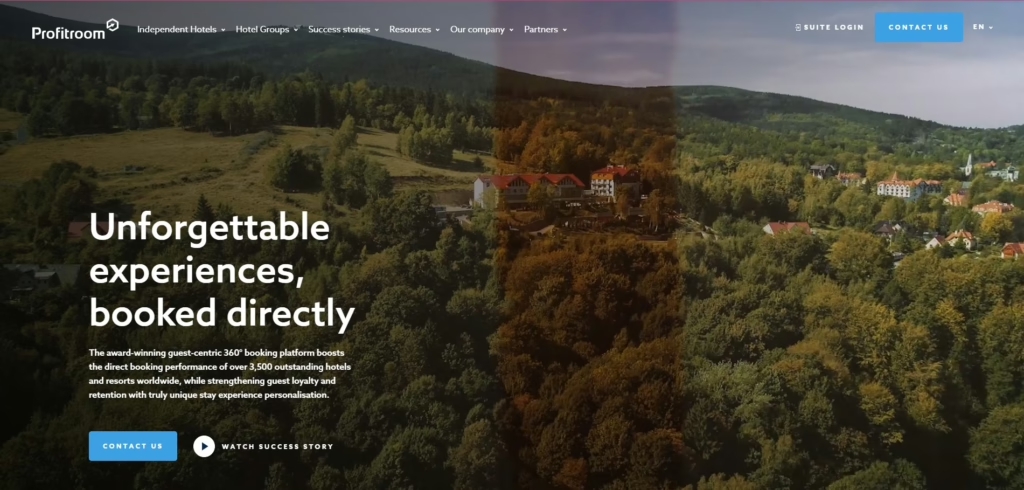
Profitroom is a software designed to increase repeat bookings through targeted marketing campaigns and real-time analytics. It is effective in boosting direct bookings, but some advanced features may require additional training for optimal utilization. Profitroom’s focus on guest behavior and preferences makes it a valuable tool for improving customer relationships and driving repeat business.
Key Features:
- Direct Booking Engine: Tools to facilitate direct reservations from the hotel’s website.
- Automated Marketing Campaigns: Targeted campaigns based on guest data.
- Analytics Dashboard: Real-time insights into booking performance and guest behavior.
Pros:
- Effective at increasing direct bookings.
- User-friendly interface for campaign management.
- Strong customer support team.
Cons:
- Limited customization options for certain features.
- May require additional training for advanced functionalities.
6. ResNexus
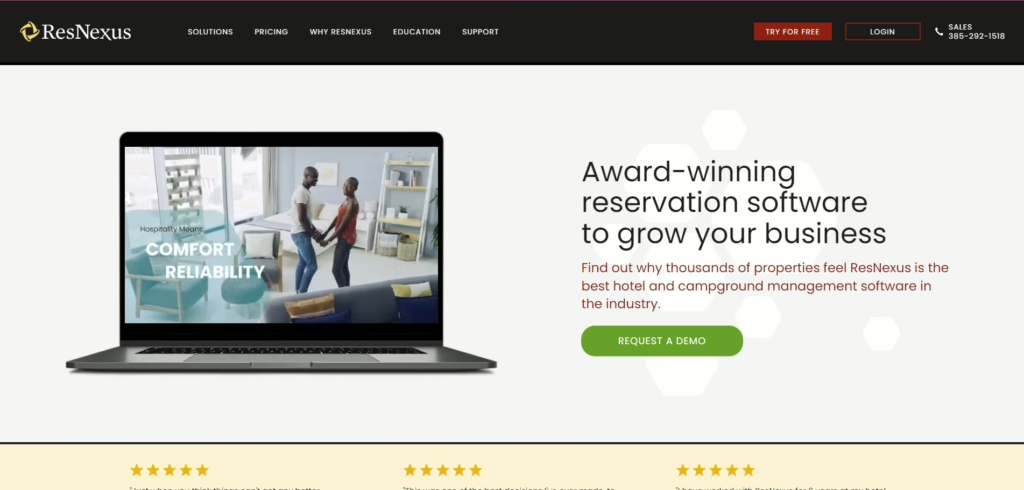
ResNexus is renowned for its seamless integration with property management systems, making it an ideal choice for hotels seeking to enhance operational efficiency. Users appreciate its user-friendly interface, but some caution that advanced features may come with additional costs. Notably, ResNexus is particularly favored by smaller properties due to its effective reservation management capabilities.
Key Features:
- Reservation Management System: Comprehensive tools for managing bookings.
- Automated Marketing Features: Email marketing tailored to guest preferences.
- Payment Processing Solutions: Secure payment handling integrated with the booking process.
Pros:
- Easy integration with existing systems.
- Strong focus on user experience and support.
- Flexible pricing options suitable for various property sizes.
Cons:
- Some advanced features may require additional fees.
- Limited reporting capabilities compared to larger CRMs.
7. Hapi
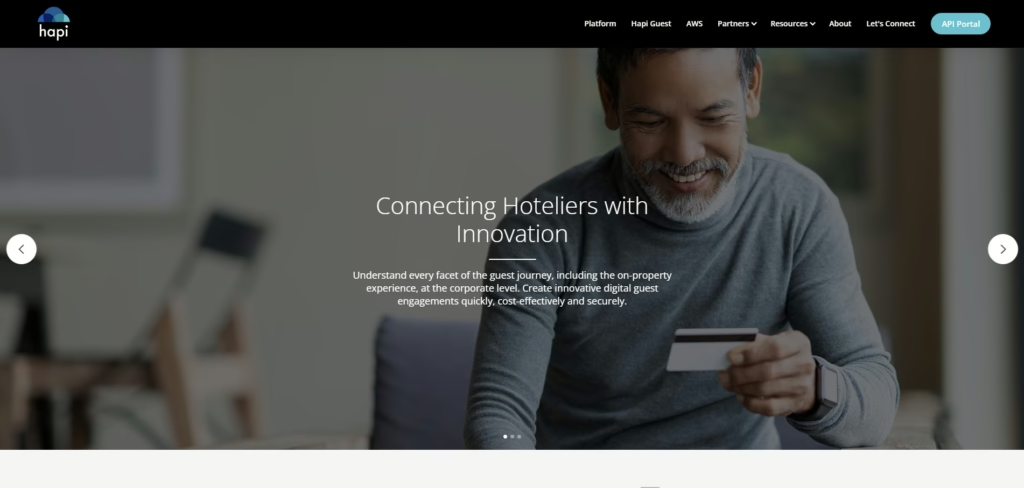
Hapi empowers hotels to personalize their services by providing real-time insights into guest preferences. This enables them to tailor their offerings effectively. Users appreciate the immediate access to data analytics, but some have suggested improvements in the user interface design for better navigation. Hapi’s focus on enhancing guest personalization positions it as a strong contender in the CRM market.
Key Features:
- Real-Time Guest Insights: Analytics on guest preferences and behaviors.
- Integration Capabilities: Seamless connections with existing hotel management systems.
- Feedback Collection Tools: Mechanisms for gathering guest feedback to improve services.
Pros:
- Immediate insights into guest behavior and preferences.
- Enhances personalized service offerings.
- Easy integration with existing technology stacks.
Cons:
- May require a learning curve for new users.
- Limited marketing automation features compared to competitors.
8. dailypoint™
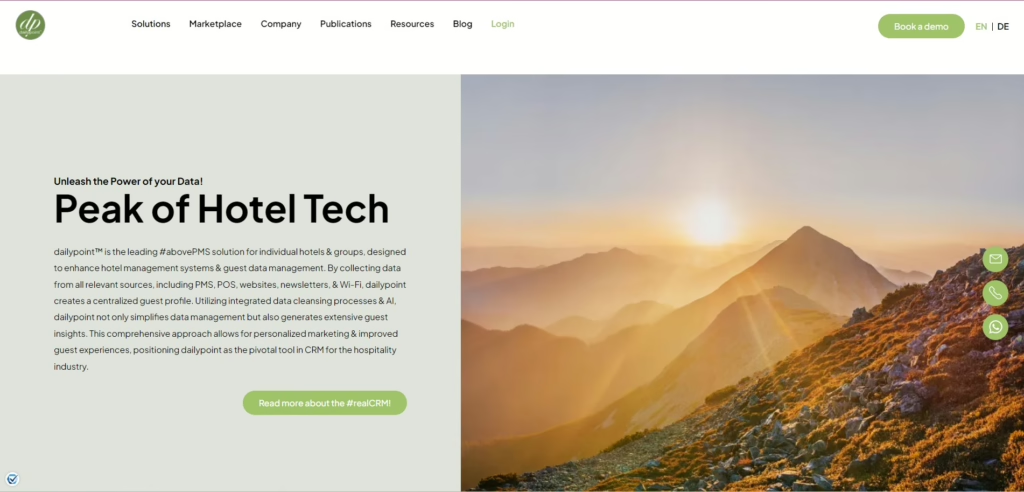
dailypoint™ excels in creating targeted marketing campaigns by leveraging extensive guest data analytics. It specializes in utilizing automation features to enhance guest engagement, although users have expressed a desire for more customization options. The CRM platform for the hotel industry effectively tailors communications to meet individual guest needs, enhancing overall guest engagement.
Key Features:
- Targeted Marketing Campaigns: Utilizing guest data for personalized outreach.
- Data Analytics Tools: Insights into customer engagement and campaign performance.
- Integration with PMS Systems: Ensuring seamless operations across platforms.
Pros:
- Highly effective at increasing engagement through personalization.
- User-friendly interface that simplifies campaign creation.
- Strong customer support and training resources available.
Cons:
- Some users report limitations in customization options.
- Pricing can be higher than basic CRM solutions.
9. Revinate
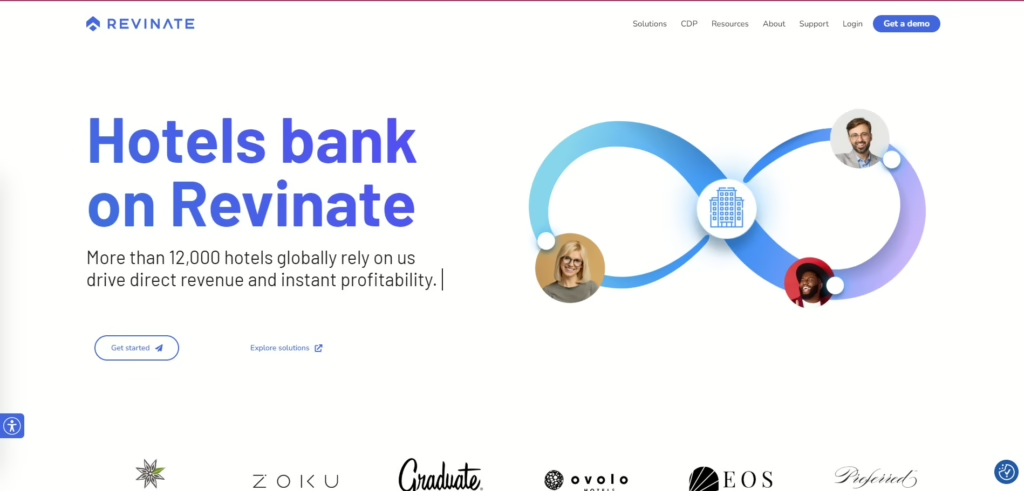
Revinate streamlines guest communication by automating processes and boosting reputation management via feedback collection tools. While users appreciate its convenience for efficient interactions, occasional concerns regarding message delivery reliability have been reported. On the other hand, its reputation management features are often praised as a major strength.
Key Features:
- Automated Guest Communication Tools: Streamlining interactions with guests post-booking.
- Reputation Management Features: Collecting reviews and managing online presence.
- Feedback Collection Mechanisms: Surveys and forms to gather guest insights.
Pros:
- Streamlined communication processes reduce staff workload.
- Effective reputation management enhances online presence.
- Strong analytics capabilities help improve service quality.
Cons:
- Some users find the interface less intuitive than competitors.
- Limited customization options for automated messages.
10. Hotel Cloud
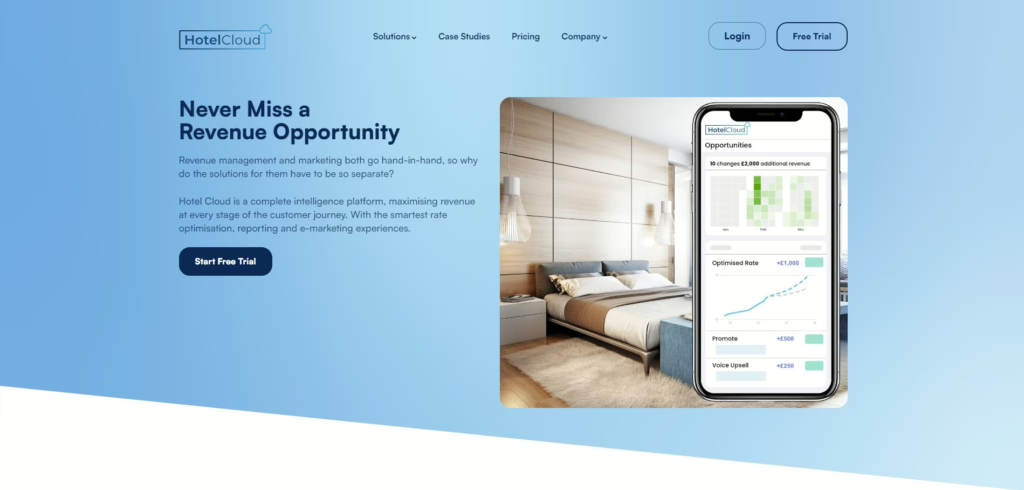
Hotel Cloud is a hotel CRM system that is specifically designed to automate guest communication, reducing the time and effort required for hotels to manage interactions. With a user-friendly interface, Hotel Cloud simplifies the automation process, enabling efficient communication between hotels and guests. Although it may not offer the advanced analytics features found in larger systems, its practicality and effectiveness in managing communications make it a suitable choice for many hotels.
Key Features:
- Automated Guest Messaging: Streamlined communication throughout the guest journey.
- Multi-channel Communication Capabilities: Engaging guests via SMS, email, etc.
- Integration with PMS Systems: Ensuring a unified approach to hotel management.
Pros:
- Saves time through automation of routine communications.
- Enhances guest satisfaction through timely updates and offers.
- User-friendly interface that simplifies setup and use.
Cons:
- Limited advanced analytics features compared to larger systems.
- May not cater well to larger hotel chains needing extensive customization options.
How to Choose the Best CRM Software for Your Hotel
- Assess Your Needs: Understand your hotel’s unique requirements and challenges.
- Evaluate Features: Compare features of different CRM systems to find the best match.
- Consider Integration: Ensure the CRM can seamlessly integrate with your existing systems.
- Scalability: Choose a CRM that can grow with your business.
- User-Friendliness: Opt for an intuitive and easy-to-use interface.
- Customer Support: Look for a vendor with robust customer support and training resources.
- Cost: Consider your budget and evaluate the overall value provided by the CRM system.
Frequently Asked Questions (FAQs)
- What is a hotel CRM system?
- A hotel CRM system is software that helps manage guest relationships, enhancing their experience and increasing loyalty.
- How does a CRM system benefit my hotel?
- It improves guest satisfaction, boosts revenue, streamlines operations, and provides data-driven insights.
- Can a CRM system integrate with my existing hotel management software?
- Yes, most modern CRM systems offer integration capabilities with PMS, booking engines, and other systems.
- Is it suitable for small hotels?
- Yes, there are scalable CRM solutions designed to meet the needs of hotels of all sizes.
- How much does a hotel CRM system cost?
- Costs vary depending on features and vendor. It’s important to evaluate the value and return on investment.
Conclusion
The hotel industry has many unique needs when it comes to customer relationship management (CRM) software solutions. The hotel CRM software solutions featured in this blog post are all excellent options for hoteliers looking to improve their guest relationships and boost their bottom line.
But what if you need something tailor-made? Something that fits the way your team runs its hotel?
With our proven history of successfully running and building CRM systems, we can assist you in selecting the ideal solution for your requirements and configuring it so that you can start seeing immediate results.
Ready to learn more about how Vinova Singapore can improve your hotel’s CRM efforts? Contact us right away for a free consultation.